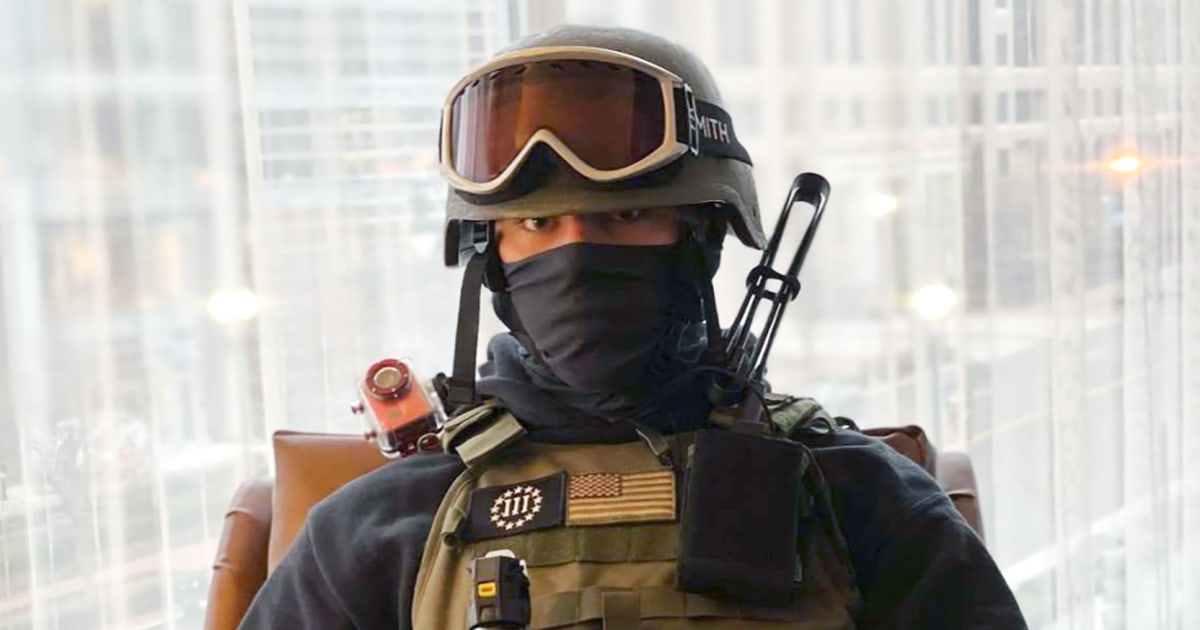
WASHINGTON — A federal judge nominated by former President Donald Trump gave a “break” Friday to a man who used bear spray during the Jan. 6 attack on the Capitol, saying he did not deserve the prison sentence requested by prosecutors.
U.S. District Judge Trevor McFadden sentenced Tyler Bensch, who pleaded guilty to two misdemeanor counts in connection with the riot, to two years of probation and 60 days home incarceration. Prosecutors had requested nine months in federal prison.
“You participated in a national embarrassment,” McFadden said before imposing the sentence. “You came ready for trouble.”
But, he added, Bensch’s involvement was “pretty minor” when compared to others, while noting that his age was a mitigating factor. Bensch was 19 years old on Jan. 6, 2021.
“I am giving you this break because of your age” at the time and a lack of criminal history, McFadden said. “This doesn’t need to define you or your life.”
Bensch was arrested in August alongside members of the “B Squad” who were associated with the far-right Three Percent movement and “Guardians of Freedom,” as well as Jeremy Liggett, a far-right extremist who ran unsuccessfully for a congressional House seat last year.
Bensch pleaded guilty to disorderly and disruptive conduct on restricted grounds along with theft of government property, admitting that he helped carry a stolen police shield from the grounds of the Capitol. In an interview with the FBI after his arrest, Bensch said B-Squad members took part in firearms training and hand-to-hand combat training ahead of the attack.
In their sentencing memo, federal prosecutors said Bensch “helped push others towards the violence” and carried a chemical irritant spray, which prosecutors said in court was bear spray. Bensch deployed the spray “against another rioter” that day.
A tearful Bensch did not speak during Friday’s sentencing hearing, but his court-appointed attorney Peter Cooper said the Florida man deeply regretted his actions. Bensch, Cooper said, “didn’t have the maturity to understand what he was getting into” and “carries great remorse for what he did that day.”
Cooper went on to say that Bensch hopes to start a career in law enforcement, adding that it’s “not beyond the realm of possibility” that he could do so even with his misdemeanors. Bensch is currently working for a pool cleaning company, and the conditions of his sentence will allow him to leave his home for employment during his 60 days of home detention.
Bensch’s case was the impetus for the departure of a self-proclaimed FBI whistleblower to take his complaints to Republican members of Congress. Steve Friend, a former FBI special agent who was based in Florida at the time of Bensch’s arrest, had been scheduled to transport Bensch but refused to do so.
Friend, according to a book he authored, told other FBI employees that he didn’t think that rioters who assaulted officers on Jan. 6 should be charged. He later testified before the GOP-led House Select Subcommittee on the Weaponization of the Federal Government, a new panel that is focused on allegations that the government is unfairly targeting conservatives.
Friend said he believed that federal authorities were bringing Jan. 6 defendants “to the gallows” because their cases were being tried in Washington, D.C. “They don’t stand a chance if they go to court,” Friend said.
Rioters have been acquitted on many charges by both jurors and judges, with McFadden acquitting Jan. 6 defendant Matthew Martin a few months before Friend was supposed to help transport Bensch.
McFadden on Friday also sentenced Bensch’s codefendant, Jonathan Rockholt, to five months in federal prison. Prosecutors had sought 13 months in prison.
The Senate confirmed McFadden in 2017 in an 84-10 vote, with all opposition coming from Democrats.
In a separate Jan. 6 case Friday, Barry Ramey was sentenced to five years in federal prison. Prosecutors had initially requested nine years in prison for the Proud Boy member who struck two officers with pepper spray, but U.S. District Judge Dabney Friedrich said that would create an unwarranted sentencing disparity.
More than 1,000 people have been charged in connection with the Jan. 6 attack, and more than 300 have been sentenced to periods of incarceration. The longest sentence — 18 years — went to Oath Keepers founder Stewart Rhodes, who was convicted of seditious conspiracy.
Source: | This article originally belongs to Nbcnews.com









